―
Iran's 'First' Executions Confront International Condemnation
―
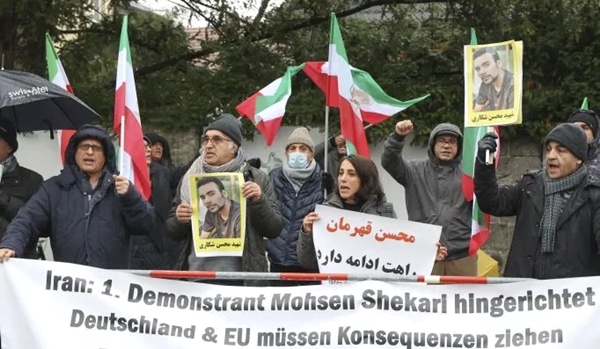
(Protest at the Iranian Embassy in Germany over execution of demonstrators. Yonhap News)
International condemnation is boiling over Iran’s execution of a man on December 8th.
The EU registered strong reproach: “The European Union demands that Iranian authorities refrain from carrying out capital punishment and further executions in the future. We call for a coherent policy toward the total abolition of the death penalty.” The United States also warned: “The regime's attempts to suppress dissent and squash protests are grimly escalating.” Germany criticized: “The Iranian regime's disregard for human rights knows no bounds.” Even an Iranian Shia cleric pointed out, “This death sentence violates our Islamic Sharia law.” What is all the hullabaloo about?
In Iran, the "hijab protest" that started with the death of a woman in her twenties last September is still going on. In response to this, many protesters have been killed or arrested as a result of the government's hardline response.
(Sunhak Peace Prize Issue about Hijab Protests in Iran: Go to previous article)
Twenty-five arrested demonstrators have been sentenced to death, the first in the series of such executions to be carried out. The remaining 24 are slated to be executed.
Meanwhile, in the sense of participating in the protests at the World Cup in Qatar, there are also reports that Iranian national football team players who refused to sing the national anthem could be arrested or sentenced to death.
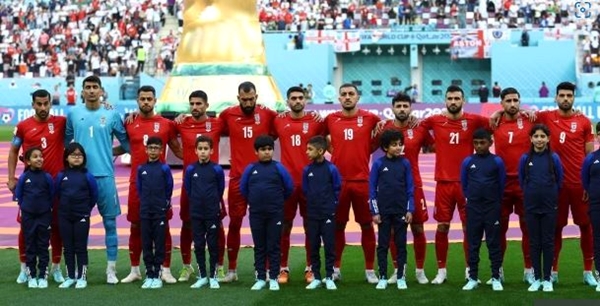
―
The death penalty has disappeared in 70% of countries worldwide
―
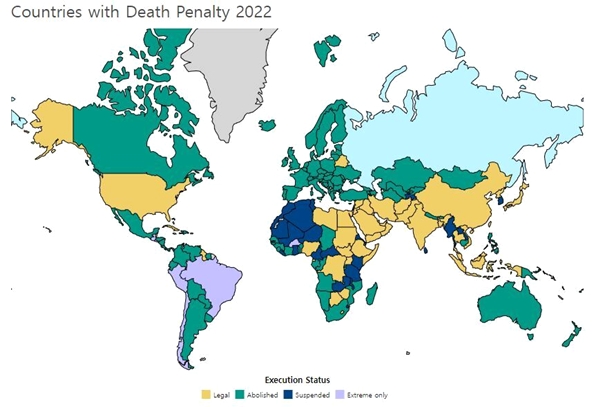
How many countries in the world have the death penalty?
According to Amnesty International data, as of the end of 2021, 108 nations have completely abolished the death penalty in law. If countries that have abolished the death penalty, which had been carried out in practice, are added, the number of abolitionist nations rises to 144. In addition, 28 nations have de facto abolished the death penalty by not carrying out any executions for 10 years, though they do have the death penalty. Fifty-five countries still keep the death penalty.
―
Report on the Death Penalty
―
Let’s find out more about the international death penalty situation through ‘Death Sentences And Executions’ published by Amnesty International in 2021 and other materials.
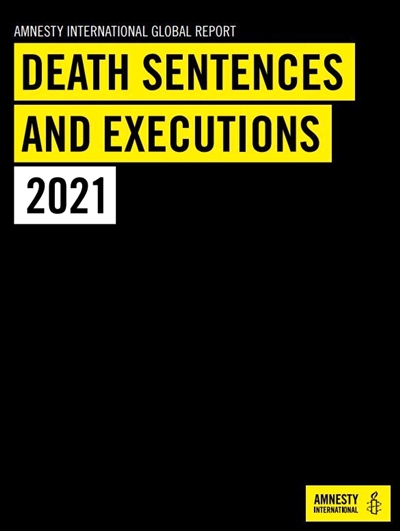
◎ In 2021, 579 executions were carried out in 18 countries, a 20% increase from 483 in 2020. However, since 2010, it is the second lowest record. Since 2020 saw a decrease in executions due to COVID-19, in fact, 2021 was the lowest since 2010.
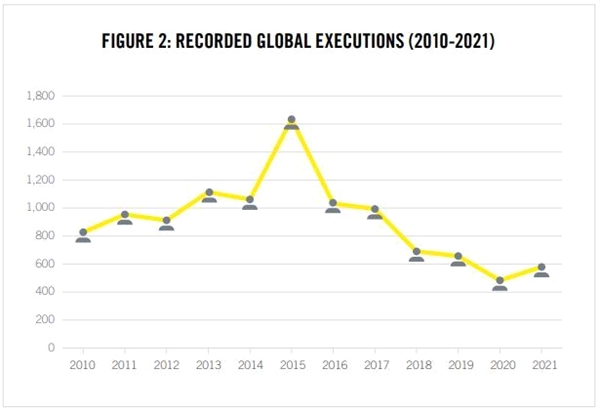
(Trends in executions by year)
◎ Which country does the most executions? China, Iran, Egypt, Saudi Arabia, and Syria executed the most executions in that order. However, since China classifies the number of executions as a state secret, the actual data is unknown. Amnesty International estimates executions in China at thousands.
In addition, it is difficult to access related data in North Korea, Vietnam, Syria, and Afghanistan, where executions are presumed to be widespread.
◎ Of the 579 people executed in 2021, 24 were women, 4%. 14 in Iran, 8 in Egypt, 1 in the United States and 1 in Saudi Arabia.
◎ Some countries have increased or resumed executions. Iran increased from 246 in 2020 to 314 in 2021, and Saudi Arabia also increased by 140% from 27 to 65. Japan, UAE and Belarus have resumed executions.
◎ Let's look at the death penalty situation. In 2021, there were 2,052 death sentences from 56 countries. This is a 39% increase from 1,477 cases in 54 countries in 2020.
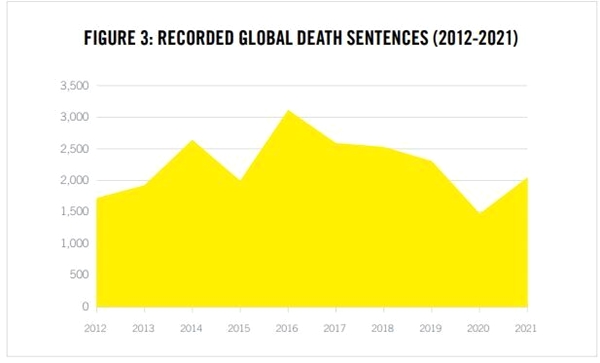
◎ At least 28,670 people have been sentenced to death by the end of 2021. These include Iraq (over 8,000), Pakistan (over 3,800), the United States (2,382), Bangladesh (over 1,800) and Vietnam (over 1,200).
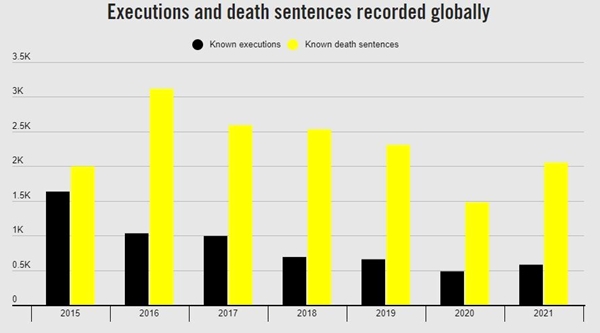
(Death penalty sentences and executions by year: black bar executions; yellow bar sentences)
◎ In some cases, international laws and standards have been violated. Some nations, such as Iran and Yemen, have executed those under age 18 if they committed a crime. Countries such as Japan and Singapore also impose death sentences on people with mental and intellectual disabilities. Countries such as Algeria, Bangladesh, Egypt and Jordan impose death sentences after unfair trials, including the absence of the accused.
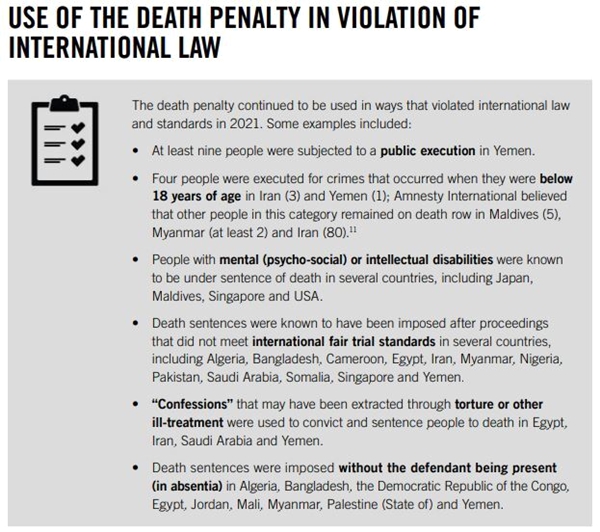
◎ Methods such as hanging, drug injection, or firing squad are used in different countries.

◎ 18 of the UN's 193 member states (9% of UN member states) carried out executions.
◎ The United States is also a country that maintains the death penalty at the federal level. Apart from the federal government, each state operates differently, such as retaining (24), suspending (3), or abolishing (23) the death penalty. Since 1976, 1,557 executions have been carried out, with 17 being carried out this year alone.
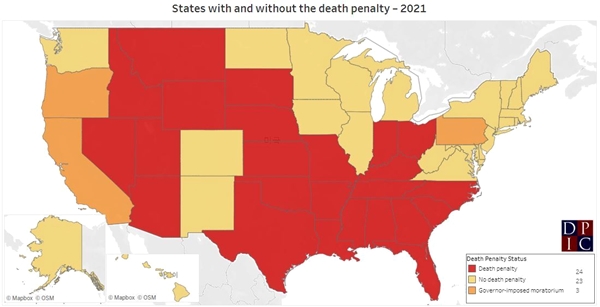
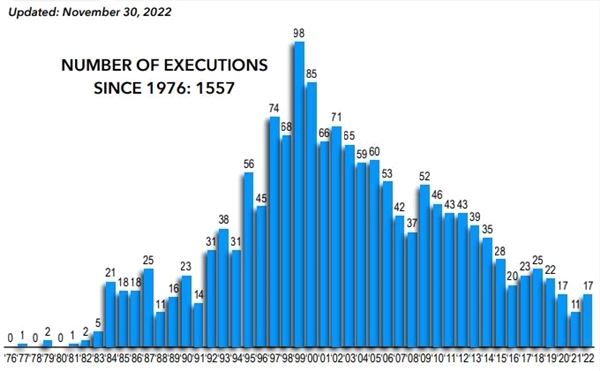
https://documents.deathpenaltyinfo.org/pdf/FactSheet.pdf
―
The future of the death penalty
―

The death penalty is a controversial and hot topic with pros and cons.
Supporters of the death penalty see it as a necessary institution to keep society safe from violent crimes.
On the other side, opponents equate the death penalty with murder and point out that the death penalty does not lower the murder rate. Also, when an innocent person is executed for political reasons, there is no way to recover the travesty of justice.
It is noteworthy that the death penalty is gradually disappearing.
Two-thirds of the world have already abolished the death penalty, and an increasing number of countries are joining the abolition or moratorium.
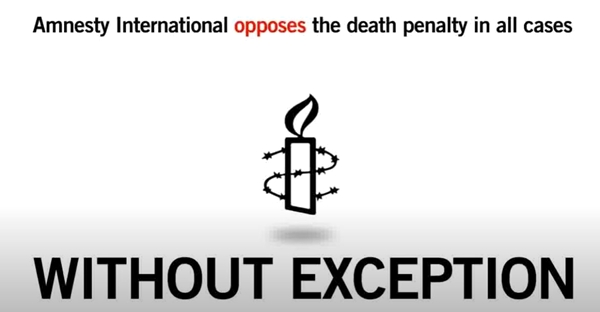
(Amnesty International anti-death penalty video)
Opponents of the death penalty designate October 10 every year as the International Day Against the Death Penalty, raising their voices for the abolition of the death penalty. It includes the EU, the African Commission on Human Rights and over 180 countries and organizations.
This year, Kazakhstan, Papua New Guinea and Malaysia also abolished the death penalty.
Abolition of the death penalty: How will it go? What is clear is that there should not be a single unfair death.
Written by Sharon Choi
Director of Planning
Sunhak Peace Prize Secretariat

